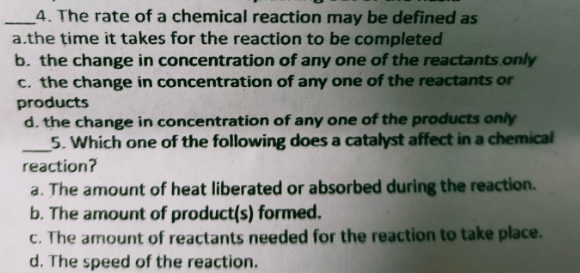_4. The rate of a chemical reaction may be defined as a.the time it takes for the reaction to be completed b. the change in concentration of any one of the reactants only c. the change in concentration of any one of the reactants or products d. the change in concentration of any one of the products only 5. Which one of the following does a catalyst affect in a chemical reaction? a. The amount of heat liberated or absorbed during the reaction. b. The amount of product(s) formed. c. The amount of reactants needed for the reaction to take place. d. The speed of the reaction.
_4. The rate of a chemical reaction may be defined as a.the time it takes for the reaction to be completed b. the change in concentration of any one of the reactants only c. the change in concentration of any one of the reactants or products d. the change in concentration of any one of the products only 5. Which one of the following does a catalyst affect in a chemical reaction? a. The amount of heat liberated or absorbed during the reaction. b. The amount of product(s) formed. c. The amount of reactants needed for the reaction to take place. d. The speed of the reaction.
Introductory Chemistry: An Active Learning Approach
6th Edition
ISBN:9781305079250
Author:Mark S. Cracolice, Ed Peters
Publisher:Mark S. Cracolice, Ed Peters
Chapter18: Chemical Equilibrium
Section: Chapter Questions
Problem 18.4TC: a What happens to a reaction rate as temperature drops? Give two explanations for the change. State...
Related questions
Question

Transcribed Image Text:4. The rate of a chemical reaction may be defined as
a.the time it takes for the reaction to be completed
b. the change in concentration of any one of the reactants.only
c. the change in concentration of any one of the reactants or
products
d. the change in concentration of any one of the products only
5. Which one of the following does a catalyst affect in a chemical
reaction?
a. The amount of heat liberated or absorbed during the reaction.
b. The amount of product(s) formed.
c. The amount of reactants needed for the reaction to take place.
d. The speed of the reaction.
Expert Solution
This question has been solved!
Explore an expertly crafted, step-by-step solution for a thorough understanding of key concepts.
Step by step
Solved in 2 steps

Knowledge Booster
Learn more about
Need a deep-dive on the concept behind this application? Look no further. Learn more about this topic, chemistry and related others by exploring similar questions and additional content below.Recommended textbooks for you

Introductory Chemistry: An Active Learning Approa…
Chemistry
ISBN:
9781305079250
Author:
Mark S. Cracolice, Ed Peters
Publisher:
Cengage Learning


Chemistry for Engineering Students
Chemistry
ISBN:
9781337398909
Author:
Lawrence S. Brown, Tom Holme
Publisher:
Cengage Learning

Introductory Chemistry: An Active Learning Approa…
Chemistry
ISBN:
9781305079250
Author:
Mark S. Cracolice, Ed Peters
Publisher:
Cengage Learning


Chemistry for Engineering Students
Chemistry
ISBN:
9781337398909
Author:
Lawrence S. Brown, Tom Holme
Publisher:
Cengage Learning

World of Chemistry, 3rd edition
Chemistry
ISBN:
9781133109655
Author:
Steven S. Zumdahl, Susan L. Zumdahl, Donald J. DeCoste
Publisher:
Brooks / Cole / Cengage Learning

Introductory Chemistry: A Foundation
Chemistry
ISBN:
9781337399425
Author:
Steven S. Zumdahl, Donald J. DeCoste
Publisher:
Cengage Learning

Chemistry: Matter and Change
Chemistry
ISBN:
9780078746376
Author:
Dinah Zike, Laurel Dingrando, Nicholas Hainen, Cheryl Wistrom
Publisher:
Glencoe/McGraw-Hill School Pub Co